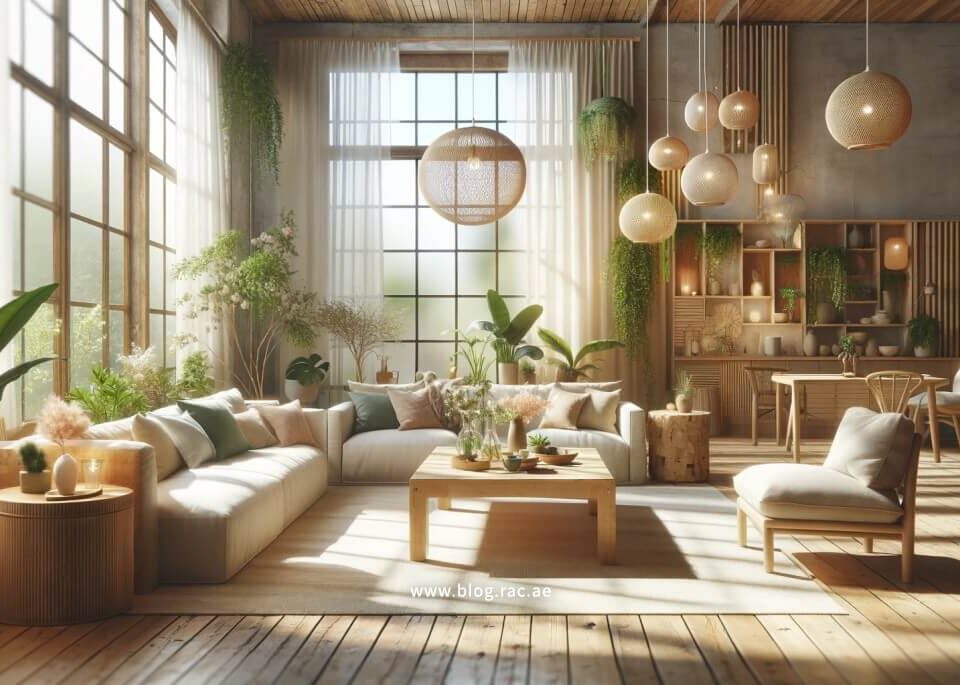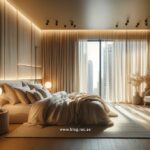
Bedroom Design Tips for Better Sleep in Dubai: Transforming Your Rest Space
January 20, 2024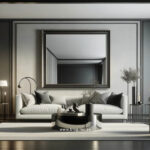
Wall Mirror Decor – Reflecting the Latest Trends
January 22, 2024Bridging the Sands of Time: Traditional Emirati Design Elements for Modern Dubai Homes
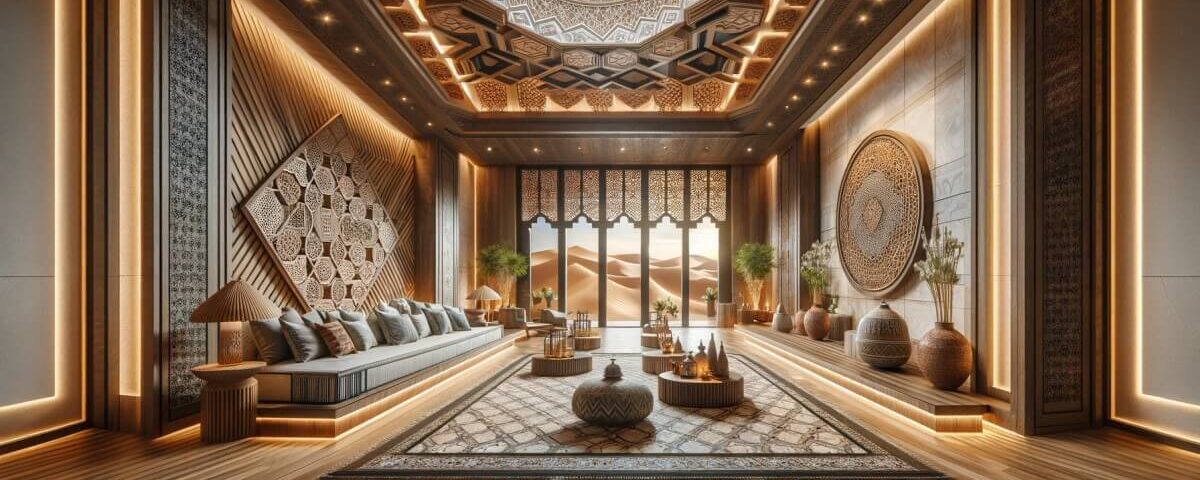
In the heart of Dubai’s modern landscape, a unique trend has emerged in 2024 – the incorporation of Traditional Emirati Design Elements for Modern Dubai Homes. This article delves into how these ancient designs are being revitalized in contemporary settings, mirroring the evolving preferences of homeowners and the progress in technological advancements.
Table of Contents
Popular Styles and Elements
Natural Materials
Modern Dubai homes are increasingly incorporating elements like wood, stone, and clay, drawing inspiration from the desert’s authentic charm. These natural materials, including rustic wooden beams, walls of exposed brick, and floors of polished sandstone, are being chosen for their organic appeal and sophisticated appearance.
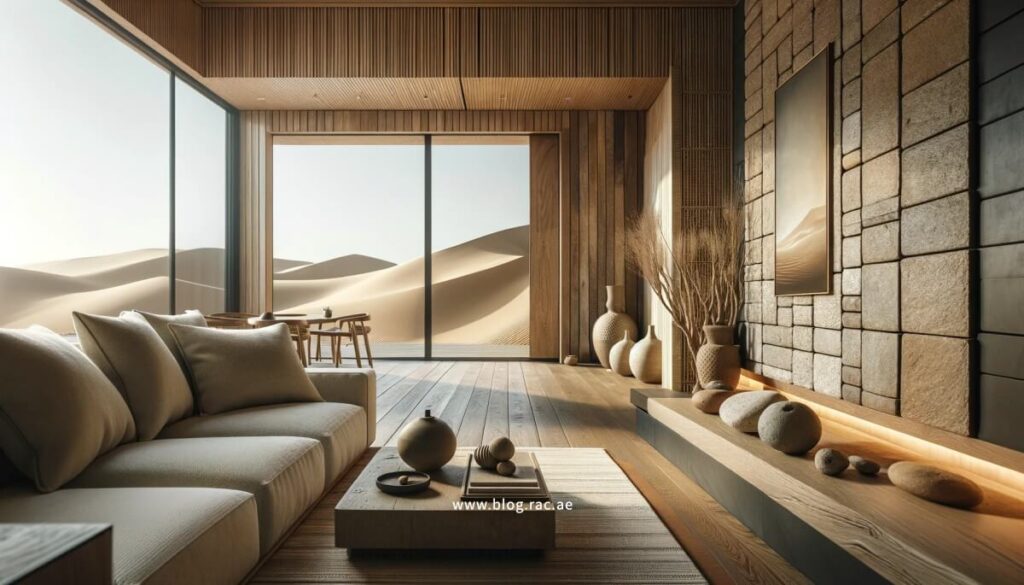
Earthen Tones
Desert-inspired color palettes, featuring deep ochres, siennas, and beiges, are in vogue. These earthy hues foster a serene environment, while splashes of turquoise bring in the vibrancy of the Arabian landscape.
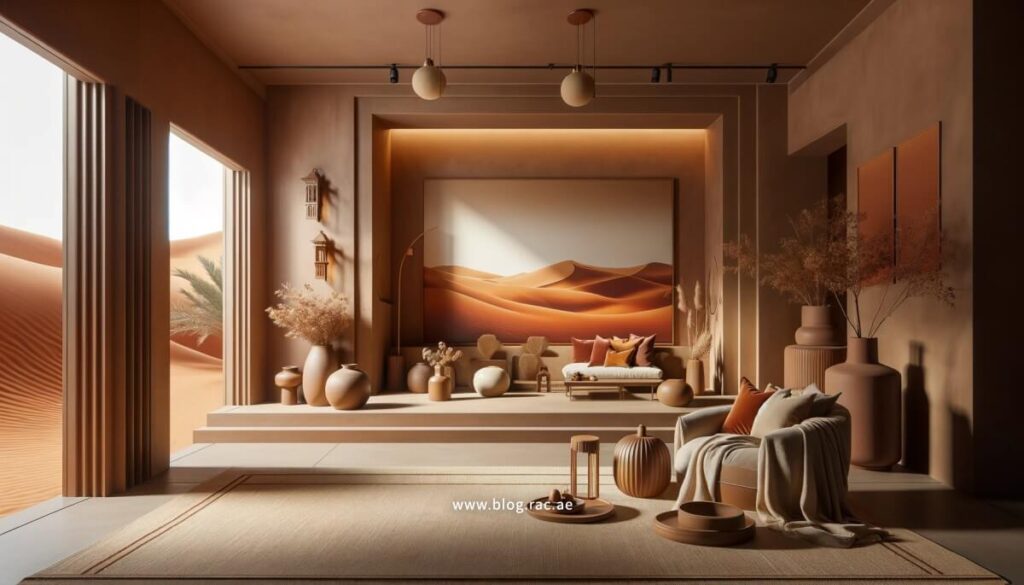
Light and Shadow Play
Echoing the ingenuity of Emirati architecture, contemporary homes are utilizing clever placement of windows and traditional screens to create interplays of light and shade. This not only achieves aesthetic beauty but also helps in naturally regulating indoor temperatures.
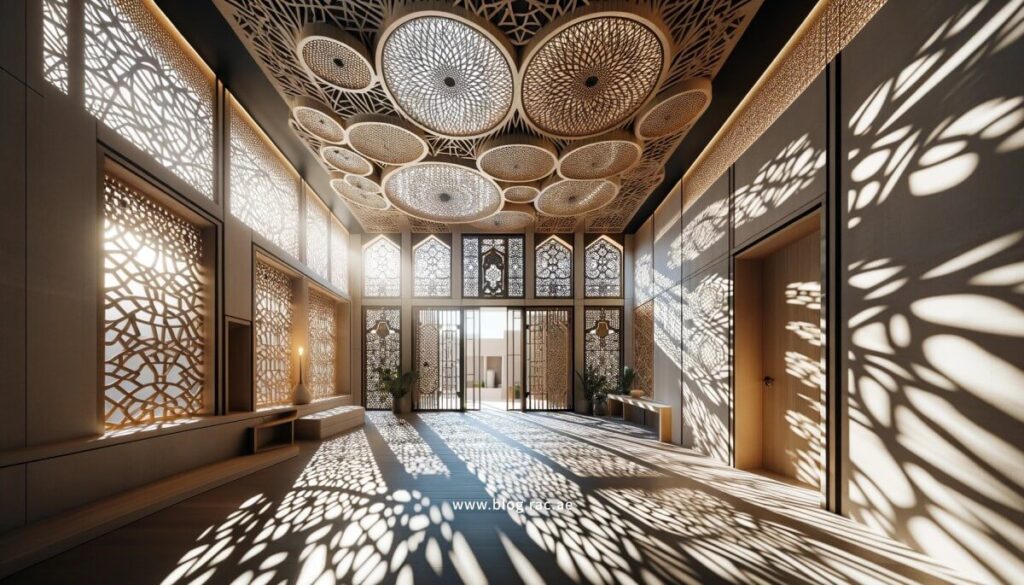
Geometric Patterns and Handcrafted Touches
Geometric motifs, reminiscent of Islamic art and Bedouin crafts, are becoming a signature element in tile designs, furniture, and wall art. Artisanal items such as handwoven carpets and embroidered pillows add a distinct cultural narrative to the decor.
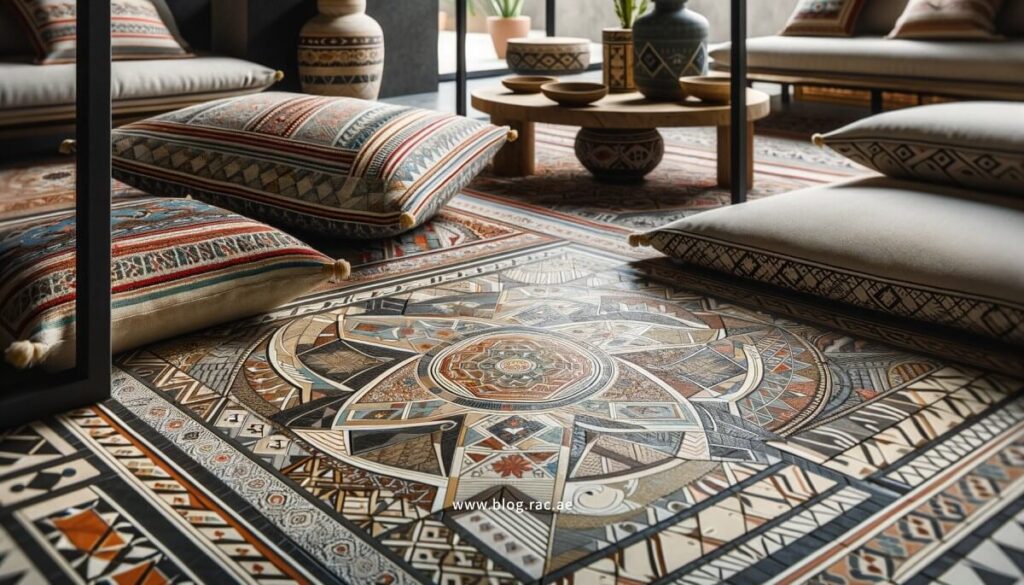
Courtyard Oasis
Taking a cue from the classic “majlis,” many modern homes are featuring central courtyards. These serene spaces serve as personal retreats or social areas, often enhanced with water features and optimized for natural airflow.
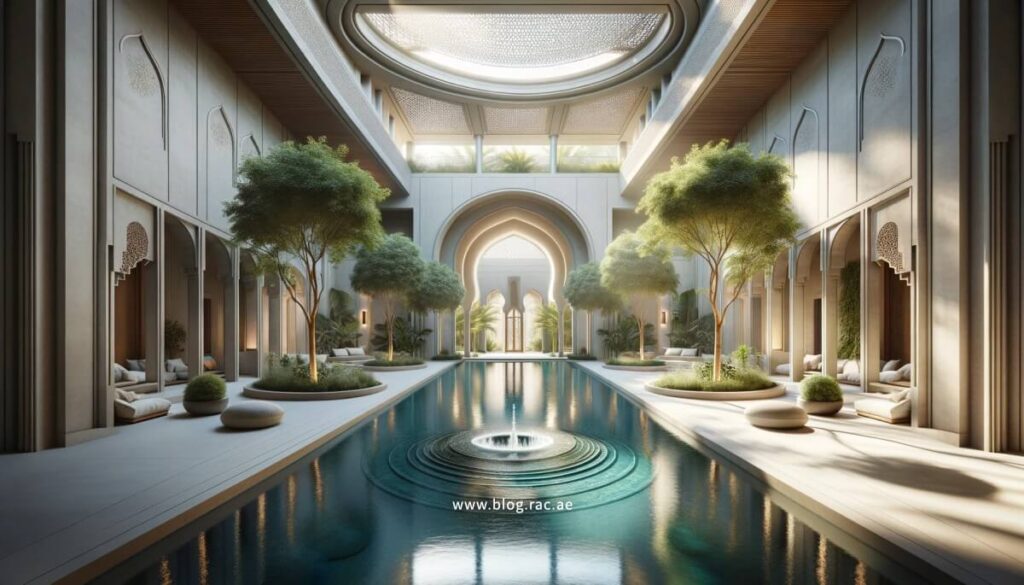
Modern Fusion
Minimalist Approach
The modern adaptation of Traditional Emirati Design Elements for Modern Dubai Homes often leans towards minimalism. This approach emphasizes simplicity and space, allowing the natural and cultural elements to stand out.
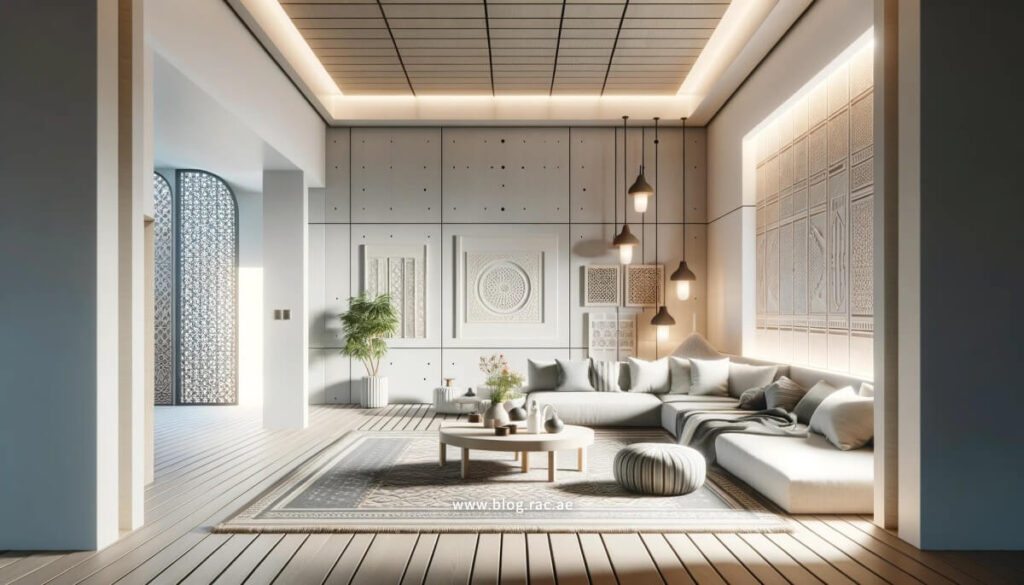
Sustainable Design
Reflecting the eco-consciousness of traditional Emirati architecture, current designs are incorporating green practices such as energy-saving appliances, reused materials, and abundant natural lighting.
Technological Harmony
In these homes, advanced technology is integrated in a way that complements, rather than competes with, traditional design elements. From smart home systems to contemporary lighting solutions, technology is used to enhance, not overshadow, the traditional Emirati aesthetic.
Key Takeaways: Integrating Traditional Emirati Design Elements for Modern Dubai Homes
Integrating Traditional Emirati Design Elements for Modern Dubai Homes merges the wisdom of the desert with modern lifestyles. Key features include the use of natural materials like wood, stone, and clay, desert-inspired color palettes, and artisanal crafts. Modern interpretations emphasize minimalism, sustainability, and the seamless integration of advanced technologies. These elements not only bring cultural richness and visual interest to living spaces but also promote eco-friendly practices and personalized touches. Embracing these design principles ensures that modern Dubai homes are both culturally meaningful and technologically advanced.
Benefits Table
| Benefit | Description |
| Cultural Depth | Brings historical and regional richness to living spaces. |
| Visual Interest | Unique patterns and textures offer visual stimulation. |
| Eco-Friendliness | Emphasizes environmentally responsible practices. |
| Individuality | Artisanal elements ensure a distinct and personal touch. |
| Tech Compatibility | Modern amenities are integrated smoothly with traditional decor. |
To conclude, incorporating Traditional Emirati Design Elements for Modern Dubai Homes is not just a trend; it represents a harmonious blend of historical elegance and modern functionality. As Dubai homeowners seek spaces that are culturally rich and technologically advanced, these design elements provide the perfect fusion of past and future.
FAQs
1. How to incorporate Traditional Emirati Design Elements in compact spaces?
Even in smaller apartments, you can reflect Emirati design through textile patterns, earth-toned color schemes, and well-placed lighting.
2. Is adopting traditional design more costly?
While some artisanal elements may increase costs, many aspects of Emirati design, like color choices and material selections, can be adapted to suit different budgets.
3. How well does modern technology blend with traditional designs?
Modern technologies can be seamlessly integrated to complement traditional designs, enhancing functionality without detracting from the aesthetic.
4. Are eco-friendly practices a part of traditional Emirati architecture?
Yes, traditional Emirati architecture has always embraced sustainability, using locally sourced materials and passive cooling methods.
5. Can I mix Traditional Emirati and Western design styles?
Blending different design styles is a popular approach, allowing for a unique space that reflects a cultural amalgamation.
6. What are Traditional Emirati Design Elements?
Traditional Emirati design elements include natural materials like wood, stone, and clay, earthen tones, geometric patterns, handcrafted touches, and courtyards. These elements draw inspiration from the desert and traditional Emirati architecture.
7. How can natural materials be incorporated into modern Dubai homes?
Natural materials such as rustic wooden beams, exposed brick walls, and polished sandstone floors can be integrated into modern Dubai homes to bring an organic appeal and sophistication that reflects traditional Emirati aesthetics.
8. What color palettes are popular in Traditional Emirati design?
Desert-inspired color palettes featuring deep ochres, siennas, and beiges are popular. These earthy tones create a serene environment, while splashes of turquoise add vibrancy reminiscent of the Arabian landscape.
9. How does light and shadow play enhance Emirati design?
Clever placement of windows and traditional screens in contemporary homes can create beautiful interplays of light and shadow, echoing the ingenuity of Emirati architecture and helping to regulate indoor temperatures naturally.
10. What role do geometric patterns play in Emirati design?
Geometric patterns, reminiscent of Islamic art and Bedouin crafts, are commonly used in tile designs, furniture, and wall art. These patterns add cultural depth and visual interest to the decor.
11. How can handcrafted touches be included in modern homes?
Handwoven carpets, embroidered pillows, and other artisanal items can be incorporated to add a distinct cultural narrative and personalized touch to the decor of modern homes.
12. What is the significance of courtyards in Emirati homes?
Courtyards, inspired by the traditional “majlis,” are central features in many modern homes. These serene spaces serve as personal retreats or social areas, often enhanced with water features and optimized for natural airflow.
13. How does minimalism integrate with Traditional Emirati design?
The modern adaptation of Traditional Emirati design often leans towards minimalism, emphasizing simplicity and space, which allows the natural and cultural elements to stand out.
14. What are the sustainable practices in Traditional Emirati design?
Traditional Emirati design emphasizes sustainability by using locally sourced materials, passive cooling methods, and incorporating green practices like energy-saving appliances and reused materials.
15. How does modern technology blend with traditional Emirati designs?
Modern technology can be seamlessly integrated into traditional Emirati designs to enhance functionality. Smart home systems and contemporary lighting solutions can complement the traditional aesthetic without overshadowing it.

